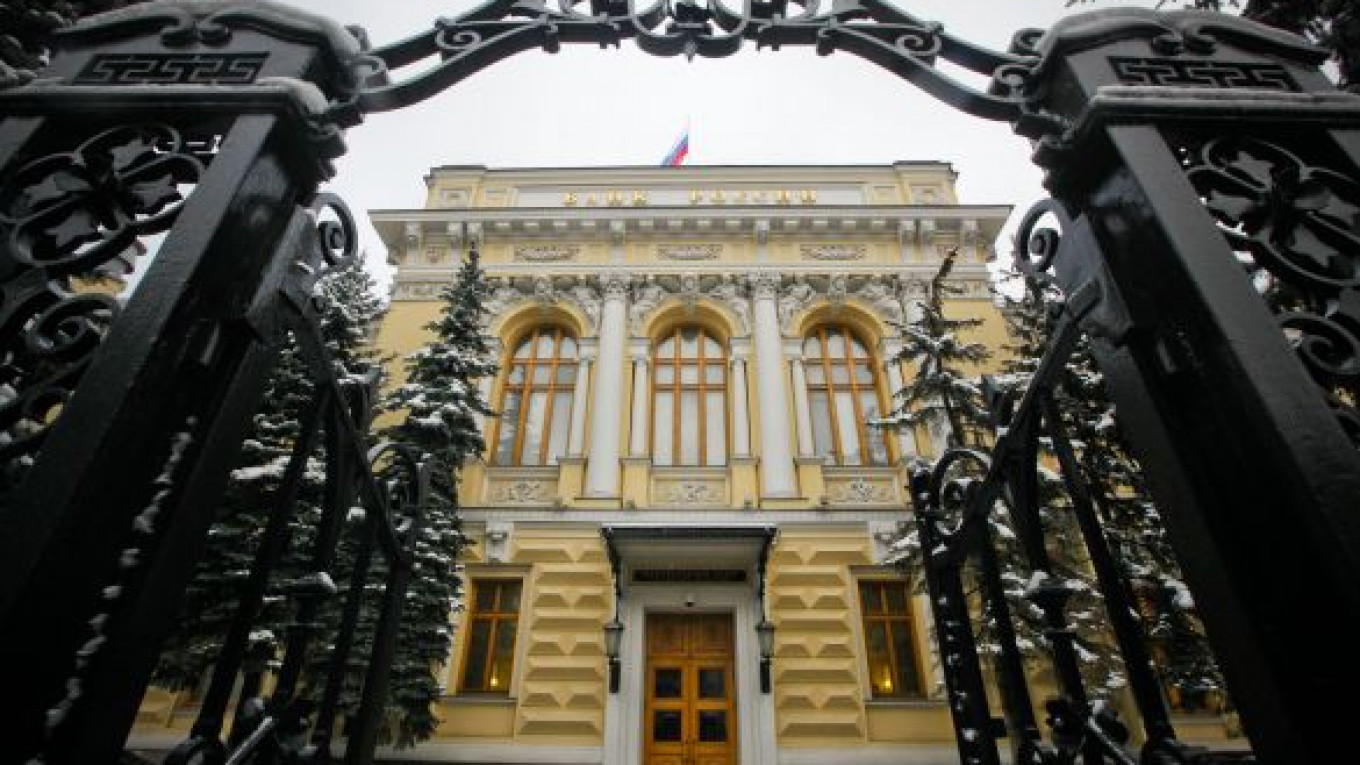The Central Bank refrained from cutting rates after signaling that record-low inflation won't last once pre-election measures to curb prices are unwound.
The regulator left the refinancing rate at 8 percent according to a statement on its website on Tuesday. The decision was forecast by 19 of 20 economists in a Bloomberg survey. The overnight auction-based repurchase rate used to provide cash for banks was held at 5.25 percent and the overnight deposit rate will remain at 4 percent.
Russia is joining central banks in the European Union, United States, Japan and Britain in waiting to gauge the strength of the economic recovery before further reducing borrowing costs. The world's largest energy exporter pushed inflation to a post-Soviet low of 3.7 percent during Prime Minister Vladimir Putin's presidential campaign by capping fuel costs and delaying utility-price increases.
"The decision was made based on an estimate of inflation risks and prospects for economic growth given the continued external economic uncertainty," the Central Bank said in the statement, adding that money-market interest rates are "acceptable for the coming months."
Policy makers left borrowing costs unchanged in February after unexpectedly cutting the refinancing rate by a quarter point in December while also raising the deposit rate, a shift they said should be "neutral" for monetary policy.
The market may expect "at least two months of peace" after the bank said rates were at an acceptable level for the "coming months," First Deputy Chairman Alexei Ulyukayev said at an investment conference after the Feb. 3 decision.
Consumer-price growth slowed for a fourth month in February to 3.7 percent from a year earlier, the lowest rate since 1991, and remained at that level as of March 5, the Central Bank said. That left the refinancing rate 4.3 percentage points higher than inflation, the highest margin since 2003, according to data compiled by Bloomberg.
"There's a risk that inflation will accelerate in the second half, and that's an unequivocal reason to leave the refinancing rate unchanged," Natalia Orlova, chief economist at Alfa Bank in Moscow, said Monday in a telephone interview. "There was definitely control over prices during the elections."
Putin's pledges may raise government spending by $160 billion, or 8 percent of projected economic output, over his six-year term, Fitch Ratings estimated in a March 5 report.
The government delayed annual increases in most public-utility tariffs until July to avoid higher prices before the vote. Deputy Prime Minister Igor Sechin ordered oil producers on Jan. 10 to cap retail fuel prices at December levels until after the election, Kommersant reported Jan. 23, citing unidentified company officials. Russian gasoline prices declined or were unchanged every week since the end of November.
Policy makers may also be reluctant to reduce rates in case it would intensify capital flight by making returns on ruble assets relatively less attractive. Net private capital outflows surged to $84.2 billion last year, the second-highest total since the Central Bank began keeping records in 1994.
Ulyukayev said in January that outflows might have been $11 billion, while Klepach estimated them at $17 billion. The amount of cash leaving Russia probably eased in February, according to HSBC Holdings.
"Although the intensity of capital outflows decreased, the outflows remain significant, supporting the current hawkish stance of monetary authorities," Alexander Morozov, chief economist for Russia at HSBC, said in a note Monday. "The Central Bank still appears very concerned."
A Message from The Moscow Times:
Dear readers,
We are facing unprecedented challenges. Russia's Prosecutor General's Office has designated The Moscow Times as an "undesirable" organization, criminalizing our work and putting our staff at risk of prosecution. This follows our earlier unjust labeling as a "foreign agent."
These actions are direct attempts to silence independent journalism in Russia. The authorities claim our work "discredits the decisions of the Russian leadership." We see things differently: we strive to provide accurate, unbiased reporting on Russia.
We, the journalists of The Moscow Times, refuse to be silenced. But to continue our work, we need your help.
Your support, no matter how small, makes a world of difference. If you can, please support us monthly starting from just $2. It's quick to set up, and every contribution makes a significant impact.
By supporting The Moscow Times, you're defending open, independent journalism in the face of repression. Thank you for standing with us.
Remind me later.






